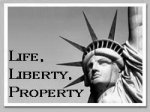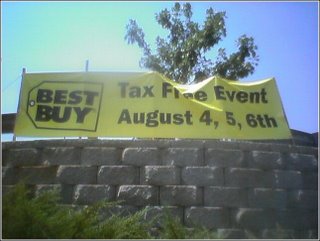That Sales Tax Holiday
 In a few hours, Virginia's first-ever sales-tax holiday for back-to-school shoppers will come to an end. It began at 12:01 a.m. on Friday and continued through the weekend.
In a few hours, Virginia's first-ever sales-tax holiday for back-to-school shoppers will come to an end. It began at 12:01 a.m. on Friday and continued through the weekend.
The "holiday" was welcomed by retailers. As the Washington Post reported today:
While we all should welcome any respite from taxes -- sales, income, or other -- could someone please explain why the General Assembly made the thing so damn complicated? Here's how the Staunton News Leader explained the program to its readers a few weeks ago:Virginia's first "no tax" holiday had area retailers hearing jingle bells on their cash registers this weekend, even though it was just a 5 percent discount.
"It's like Christmas in August," said Leah Belcher, Wal-Mart manager for Northern Virginia. "The back-to-school aisles are packed."
From Friday through today, Virginia waived sales tax on school supplies costing less than $20 and clothing or shoes priced below $100. It's the state's first experiment with the tactic, aimed at offering a break to families who face big back-to-school bills. It's also been a huge windfall to large retailers.
The list of what is tax-exempt this weekend and what is not reminds me of the old days of blue laws (laws against Sunday commerce), in which states carved out exceptions to a general rule of no-sales-on-Sunday. Noted Jeff Jacoby in the Boston Globe last November:Some of the items covered by the tax holiday under the heading of "school supplies" and "clothing" are a bit surprising. For example, Virginians can use the sales tax holiday to stock up on choir and altar clothing or clerical vestments. On the other hand, they can't buy fabric, thread or yarn to make their own clothing. Young dancers can buy leg warmers and leotards — but no tap or ballet shoes. Professional-looking students can exploit the sales tax holiday to pick up a book bag — but if they want a briefcase, they'll have to pay tax on it.
Go figure.
There used to be a section of the Virginia Code, 18.2-341, which was repealed only in 2004, which stated:Ah, yes, the blue laws -- those rules and regulations imposed by New England's 17th-century Puritan theocrats to govern moral conduct and ensure proper observance of the Sabbath. The product of an era when ''witches" were hanged, blue laws dictated what people could wear, forbade travel on Sunday, and made it an offense to miss church. The Puritans ''carried their efforts to control private activities in the Massachusetts Bay Colony to extremes unknown elsewhere," notes the Family Encyclopedia of American History. For example, church doors were bolted during Sunday services to prevent restless congregants from leaving early.
It is hard to imagine how these laws could have survived the ratification of the Bill of Rights. But survive they did, some of them for centuries. In Massachusetts, Chapter 136 long barred most commercial activity on Sundays and legal holidays. Not even Cotton Mather would have been able to make sense of the anachronistic crazy quilt of definitions and loopholes that the law turned into over time. The same statute that barred shops and businesses from operating on ''common days of rest" also listed dozens of exceptions to the rule, including the sale of nitrogen, the operation of garden centers and public bathhouses, and the transportation of ice, bees, or Irish moss. Supermarkets weren't allowed to sell groceries, but convenience stores were. Buying a painting at an art gallery was OK. Buying paint at
Home Depot was forbidden.
On the first day of the week, commonly known and designated as Sunday, no person shall engage in work, labor or business or employ others to engage in work, labor or business except in the following industries and businesses:and then went on to exempt, in 22 sub-paragraphs, nearly every imaginable form of commercial activity (liquor sales in ABC stores remain forbidden on Sundays).
I'm reminded of this crazy-quilt of blue laws because of the bizarre list of items that qualify for the tax holiday this weekend. For instance, the list of exempt items includes:
• BindersBut it does not include -- this is 2006, remember, in the second half of the first decade of the 21st century -- computers or computer-related supplies. Here's a list of what is not acceptable:
• Blackboard chalk
• Book bags
• Calculators
• Cellophane tape
• Clay and glazes
• Compasses
• Composition books
• Crayons
• Dictionaries and thesauruses
• Erasers
• Computer storage media; diskettes; compact disksIt is my understanding that the House of Delegates bill that originated the tax holiday included computers and computer-supplies among tax-exempt items for the weekend, but the Senate, in its wisdom, deleted that clause. As the News Leader said: "Go figure."
• Handheld electronic schedulers
• Personal digital assistants
• Printers for computers; and
• Printer supplies for computers; printer paper, printer ink

Still, big-box stores and electronics supply houses are not letting that stand in their way. (See the photo, to your right, which I took today outside the Charlottesville Best Buy.) They are just eating the cost of the normal tax in order to give their customers a 5% discount. As Michael Shear and Sandhya Somashekhar reported last week in the Washington Post:
...the law allows merchants to absorb the cost of the sales tax for any item, making it appear tax-free to customers.It's good that the retailers are taking the initiative. But I still go back to my original question: Why did the General Assembly make this so complicated?As a result, several of the state's largest retailers -- Circuit City and Wal-Mart, for example -- are expanding the sales tax break to entice customers during a normally slow time.
"We have decided to go ahead and not charge the sales tax for all products purchased in Virginia," said Bill Cimino, a spokesman for Circuit City, which is based in Richmond. "We've seen sales tax holidays in other states. We've seen the interest and the excitement generated by it."
The easiest, most logical, most consumer- and business-friendly thing to do for the tax holiday would simply have been to decree that on this particular three-day weekend, all items with a retail price of $100 or less would be tax-exempt. That would be simple to program into stores' computers, and it would be simple for the average customer -- that is, taxpayer -- to understand.
Well, nobody ever accused legislators of being consumer-friendly -- or logical.
Update: Check out the gift items I have designed at my CafePress shop, called (naturally) "Gifts from RickSincere.com."



No comments:
Post a Comment